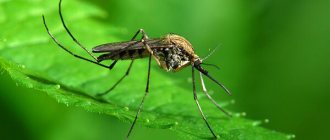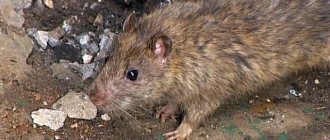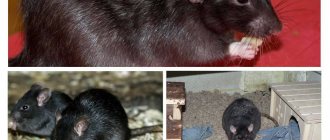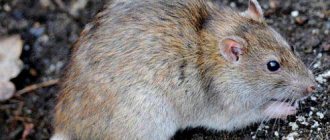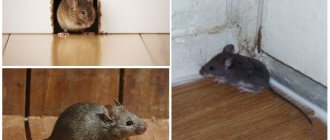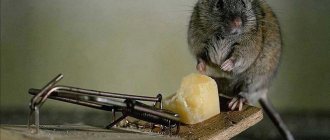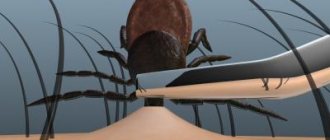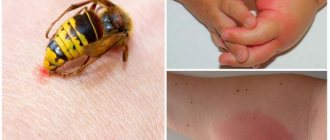When and why do rats attack people?
Despite the fact that rats prefer to live near people, they try not to meet them. But it happens that rats attack. Most often this is caused by the following reasons:
- the rodent is cornered and has no other way to escape;
- the rat reacts to aggression directed at it (if you shout at it, wave your hand or stick);
- the mother who protects the offspring is attacked;
- the rat is in a state of stress for a long time (because of this, even animals from a pet store can bite).
Bite
Much less often rat attacks on people are explained by the severe hunger that rodents experience. Even very hungry rats cannot eat a person, but they are quite capable of biting off a piece of skin or even meat.
In addition, a rat infected with rabies can attack a person. In this state, the animal experiences severe suffering, as a result it becomes aggressive and is no longer afraid of anyone.
What makes a rat bite
Rats don't bite for no reason. A rather banal situation can motivate one to “taste” one’s owner or relative, for example:
- The rodent was hurt.
- The animal is scared.
- The animal is experiencing severe hunger.
- The animal wants to attract the owner's attention.
Such incidents are isolated, rare, and do not require urgent action. There is also no need to panic when a rat bites in a cage or bites its relatives. In nature, rodents use biting as a way of communication; they use it to express their dominance and communicate. Under normal circumstances, this does not cause pain to the “neighbors” and leaves no wounds.
Pets can bite when physiological processes occur in the body. At this time, a certain change in character occurs. If you provoke your pet and allow him to bite, it will develop into a habit.
How do rats attack?
Most often, rats bite people by attacking from a short distance. Before an attack, the animal prepares for some time, rising on its hind legs and swaying from side to side. Then it makes a warlike squeak and jumps. In this case, the rodent usually bites the leg, but more often the attack is a way to scare, so it can do without a bite.
If you try to catch a rat, it bites the hand extended to it. A pet rat may bite a finger, for example, if it does not like the way it is being held, or if you poke your fingers through the bars of the cage when the animal is not in the mood to communicate.
Sometimes rats gnaw the skin on the heels of sleeping people (this often happens in warm countries with homeless people sleeping on the street), for the time being this is done so carefully that the person does not feel that the rodent is biting and does not wake up. True, only until the sharp teeth sink into the soft tissue.
Why does the rat chew the cage?
By nature, a rat is supposed to chew everything in its path. The cell is no exception. Many pets do this at night, preventing them from falling asleep. Experience shows that for the animal this is more entertainment than an attempt to grind down its incisors. Rats chew the cage out of boredom if there is only one animal in it.
Most often, nervous animals engage in such things, but even completely healthy individuals will not deny themselves such pleasure. It is almost impossible to stop a rat from chewing its cage, but there are some things you can try:
- place a mineral stone, a twig, a piece of wood or a cracker in the cage before going to bed;
- cover your favorite “gnawing” spot with a mineral stone and hang branches between the bars;
- Move the cage to other objects with animals so that the animal does not get bored.
You should get several same-sex rats, then they will be busy with their relationships and, perhaps, will not touch the bars.
Differences between rat bites and bites of other animals
A rat bite looks like two rather deep, most often bleeding wounds, consisting of two closely spaced punctures - marks of the upper and lower incisors, respectively. It is from such a trail that one can understand that the attacking animal was a rat. It is true that it is quite difficult to distinguish a rat bite from the bite of another rodent, since they are very similar in appearance. True, the rat's teeth marks are larger.
But in general there is no special need for such a diagnosis, since bites of any rodents are equally dangerous and require similar treatment.
First actions after a bite
The first thing to do if bitten by a rat is to thoroughly rinse the affected area and then thoroughly treat it with an antiseptic. Any remedy will do - hydrogen peroxide, Miramistin, alcohol, Chlorhexidine.
But what you shouldn’t do if a rat bites you until you bleed is try to stop the bleeding. Firstly, deep wounds can bleed for a long time, and secondly, some pathogenic bacteria will come out with the blood.
After the wound is washed, it should be bandaged. This will help avoid mechanical damage and dirt. If the condition of the wound worsens (for example, inflammation or suppuration) or your health worsens, you should immediately consult a doctor.
Treatment of the wound
What danger does a rat pose?
Each person reacts differently to rodent bites. Much depends on the person’s immune system and the correctness of first aid. But we should not forget the most important factor - how sick the animal is or what kind of infection it is carrying.
If a decorative rat was just purchased from a pet store and bit its new owners, you should definitely treat the wound and consult a doctor. Therefore, after purchase, it is recommended to take your pet to a veterinary clinic for examination.
When an animal has been kept in appropriate home conditions for a long time (receives vaccinations, does not have contact with other animals, etc.), the likelihood that its bite will cause a serious illness is quite small.
It is not the animal itself that can provoke an inflammatory process in the bite area, but pathogenic bacteria that may be on the victim’s skin or on the rodent’s teeth. The fact is that the rat has thin and sharp teeth. When bitten, the skin folds inward and not always all the microbes have time to come out with the blood before it begins to clot.
If the bitten person begins to feel unwell, his body temperature rises, muscle (joint) pain appears and the affected area becomes inflamed, then qualified medical care is required. These symptoms may indicate that blood poisoning has occurred.
Bites from wild rodents pose a more serious danger because, unlike pets that are fed by their owners and who live in fairly clean conditions, wild rats always live in places where garbage and waste accumulate. The consequences can be very different, since it is not known what kind of infection the bitten individual could have carried. Also, unlike a domestic rat, which can be taken to a veterinary hospital for a blood sample to be taken and the infection can quickly be determined, a wild rodent is quite difficult to find and catch.
You cannot be completely immune from the fact that a domestic or wild animal does not bite. Therefore, some safety rules should be followed. Rats, like many other mammals, do not attack unless they perceive a threat to themselves or their offspring. If the animal is pregnant or already has small offspring, you should be as careful as possible when handling them. A rat may also attack if it is in pain or afraid.
Symptoms of infection
Characteristic symptoms of diseases carried by rats:
- weakness;
- chills;
- temperature increase;
- headache;
- nausea, diarrhea, abdominal pain;
- insomnia;
- muscle contraction at the site of the bite;
- severe pain at the site of the bite (even if the wound has already healed).
Without treatment, some diseases can lead to severe consequences and even kill a person, so if alarming symptoms appear, you must urgently visit a doctor or call him at home.
The incubation period for diseases that can be caused by a rat bite ranges from 2-3 days to 2 weeks. If you feel unwell within this period, you should definitely tell your doctor about the bite. This information can be decisive in choosing the necessary tests and making a diagnosis.
What infections do rats spread?
Rodents eat everything they come across: garbage, stale and rotten waste,... Therefore, the composition of the microflora in their mouth has a very wide range: harmful bacteria, viruses that can cause inflammation in the most optimistic case, and in the worst case. Rat bites, due to the characteristic deep wound, in 90% of cases cause its inflammation and the appearance of a purulent process.
Rodents are carriers of many infectious diseases, some of which are deadly. Therefore, it is so important to immediately disinfect the wounds when bitten by a rat and immediately consult a doctor for help.
On a note!
According to statistics, more than 15 thousand people in the world suffer the consequences of rat bites every year, of which 100 cases result in death.
What dangerous diseases do rodents spread and why is a rat bite dangerous?
- Leptospirosis is a serious disease caused by bacteria of the genus Leptospira, which results in infection of internal organs (liver, kidneys) and the nervous system. The probable mortality rate is 16% of affected patients. Its symptoms: high temperature up to 40 ºС, chills and headaches, after 2 days the liver becomes enlarged, accompanied by severe pain in the calves and legs.
- Listeriosis - the causative agents are pathogenic Listeria bacteria, the disease is very dangerous for pregnant women, because can cause miscarriage, affects people with reduced immunity most of all.
- Toxoplasmosis is an infection caused by Toxoplasma, dangerous for pregnant women due to possible damage to the fetus with a probability of 40%.
- Yersiniosis is an infectious disease that causes damage to the gastrointestinal tract and severe intoxication, incl. affects the musculoskeletal system and liver. The disease often manifests itself within 3-7 days, sometimes after 18 days, with the following symptoms: fever up to 40 ºС, pain in muscles and joints, head and abdomen, nausea and diarrhea.
- Cryptosporidiosis is a disease caused by coccidia and affects the stomach and gastrointestinal tract. Symptoms: severe diarrhea for several days, sometimes up to 1 month, abdominal pain.
- Syphaciosis is a helminthic disease in rodents.
- Q fever is an infection that causes symptoms in a person: general weakness, joint and muscle pain, dry cough, loss of appetite and sleep, and headache.
In addition, the saliva that rats secrete when they bite may contain viruses of dangerous diseases such as tetanus and rabies. Relief from infections can be by visiting a doctor within a few hours and administering a special serum. Rabies and tetanus are deadly diseases for humans.
Possible consequences of rat bites
Possible consequences of a rat bite are:
- scratches, abrasions;
- lacerated deep wounds;
- hematomas;
- bruising;
- In rare cases, a bite to the finger can cause a fracture.
Infection of the wound can cause suppuration. If the abscess is not opened in time, an ulcer, abscess and even gangrene may develop. In the most severe cases, there is a possibility of blood poisoning.
But the main danger of rat bites is the risk of contracting infectious diseases, including:
- sodoku (pathogenic microorganisms entering the body spread through the lymphatic tract, affecting internal organs - liver, kidneys, ovaries, adrenal glands, meninges);
- tetanus (a dangerous disease with a high mortality rate and a high probability of complications);
- leptospirosis (an acute infectious disease that affects capillaries, muscles, liver and kidneys, occurs with symptoms of fever and intoxication);
- pseudotuberculosis (the disease is characterized by damage to the liver and small intestine, the main symptoms are fever, intoxication, rash);
- rabies (a deadly disease that affects the brain).
Rabies virus
In addition, rat bites are dangerous because of the consequences for the human psyche. Many people develop severe phobias, which are very difficult to get rid of.
Are the bites of ornamental rats dangerous?
Pets can also become aggressive. Most often, a bite from a domestic rat is associated either with the unbalanced character of the animal or with improper handling of it. If you are bitten by a domestic rat, you need to do exactly the same as if you are bitten by any rodent - wash, treat and bandage the wound.
The threat of contracting an infectious disease in this case is minimal. But if a decorative rat bites constantly, the first thing to do is to think about it and either change the conditions in which the animal is kept, or seriously engage in its upbringing.
The situation when a domestic rat bites until it bleeds is quite rare. More often, the rodent only bites the skin while playing or expressing dissatisfaction. A strong bite is most often provoked by pain caused to the animal.
Can a person get sick after a rat bite?
Usually, after being bitten by a domestic rat, two diseases appear - tetanus and rabies. Vaccination against them after a bite is mandatory, however, the list of possible infections does not end there.
Possible diseases that pets carry:
- Streptobacillosis, or Haverhill fever. This infection is fatal if left untreated. It is transmitted not only by bites, but also by kissing a pet.
- Hemorrhagic fever.
- Leptospirosis.
- Paratyphoid fever, helminths. Simply put, it is a worm infection. In a pet’s body, this occurs in cases of poor hygiene.
- Tularemia.
Treatment for any of these diseases will require medical intervention, some involving hospitalization and long courses of antibiotics. It is important to understand that infections can be transmitted not only by bites, but also by kisses, and contact of biological fluids (urine, blood, saliva) of a pet on open wounds on the owner’s body.
What to do if rats bite children?
A child who has been attacked by a rat must first be calmed down. Such a negative experience can be remembered for the rest of his life, causing the development of neuroses and fear of animals. The wound should be treated with an antiseptic, bandaged, and the child’s condition should be monitored for 1-2 weeks.
If rats have bitten children in a kindergarten or school, providing medical care to the injured children is not enough. It is necessary to bring information about the incident to the attention of the relevant authorities (district office of the SES, Rospotrebnadzor), demand an inspection and take measures based on its results.
If a rat bites your pet
An adult pet bitten by a rat usually does not need help from its owner. The animal will cope on its own by carefully licking the wound. Since the saliva of cats and dogs is a fairly strong antiseptic, prolonged licking will be quite sufficient for treatment. If the wound is deep or the pet is young, you can wash the wound, treat it with an antiseptic and, if possible, bandage it.
If the owner thinks that after a rat bite there have been changes in the behavior or condition of the animal, you should not pretend that nothing is happening, it is better to play it safe and consult a veterinarian.
How to avoid being bitten?
To prevent a rat from biting you, just follow simple rules:
- try to avoid vacant lots and abandoned buildings, be careful when going down into basements and passing areas with garbage cans;
- when meeting a rodent, do not try to catch it, do not make sudden movements;
- Having discovered a nest with pups, do not touch them; the mother is most likely nearby and will rush to protect the cubs;
- if the rat behaves aggressively, you should carefully retreat (you can scare the animal away by splashing water at it).
Pet rats must be handled carefully so as not to hurt them - do not lift or pull the tail, do not squeeze too hard.
